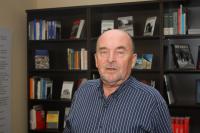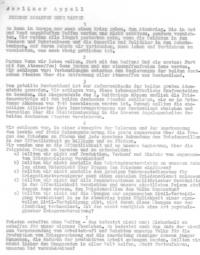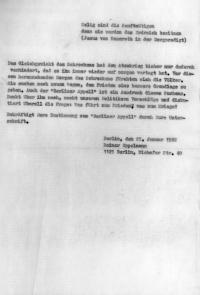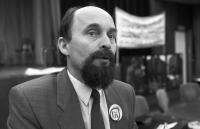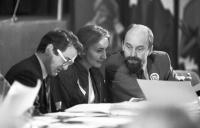We need to stop whispering and say things out loud.

Download image
Rainer Eppelmann was born in 1943 in Berlin-Pankow. His father was a carpenter, his mother a dressmaker. Eppelmanns parents were critical towards the GDR regime and raised their children in the Christian faith. Eppelmann was neither a member of the pioneers, nor of the FDJ. He did not receive the national youth initiation, but received a Protestant confirmation. After he had completed secondary school, he was denied to attend higher education in spite of his excellent grades. This was in part due to the fact that he was not a member of the Communist youth organizations. In addition, his father was considered to be a so-called “Grenzgewinnler” (somebody profiting from living at the border) because he lived in the GDR, but worked in West Berlin. Eppelmann and his sister were able to attend the Johannes-Kepler-Gymnasium in Neukölln, one of the two schools which had been established in West Berlin for students from East Berlin. The construction of the Berlin Wall on 13 August, 1961, marked the end of his schooling. At that point, Eppelmann attended the 11th grade and as a result he could not take his school-leaving exam. Thus, his dream of studying architecture was shattered. After the construction of the wall, his father remained in the West. After some time, Rainer’s mother and the two younger siblings were allowed to move to the father in the context of family reunification. Eppelmann himself stayed in East Berlin and worked as an assistant roofer. After a year, he was offered an apprenticeship as a mason and plasterer, which he accepted and completed in the years 1962 to 1965. After his apprenticeship, he applied for the School of Civil Engineering. Soon after the beginning of his studies, however, he realized that he no longer could bear the system, fell repeatedly sick and eventually broke off his studies. After abandoning his studies, Eppelmann again worked as a mason. In 1966, he was drafted into the army as a “Bausoldat” (construction-work soldier), after he had refused military service for religious reasons. In the course of his service, Eppelmann was sentenced to eight months of prison for multiple acts of insubordination. Eppelmann publicly disclosed his oppositional stance for the first time with the signing of a statement of solidarity at the Czechoslovak embassy after the suppression of the Prague Spring. After his time as Bausoldat, Eppelmann in 1969 decided to study theology at the Paulinum College .After completing his studies in 1975, he was first an assistant pastor, then parish priest in the East Berlin Samaritan community and district youth pastor for the church district Berlin-Friedrichshain. Together with the blues musician Günter Holly Holwas, Eppelmann since 1979 organized the so-called Blues Masses, combining religious services with concerts and criticism of the communist regime. These events soon attracted hundreds of young people who had up to that point not come in touch with the church. In this way, the events became a platform for dissenters. The Blues Masses would eventually attract as many as 8,000 - 9,000 young people from all over the GDR, which did not escape the attention of the state security. The state security exerted considerable pressure on Eppelmann and the church authorities. Nevertheless, the Blues Masses continued to be held until 1986. In 1982, together with the communist dissident, Robert Havemann, Eppelmann drafted the Berlin Appeal “Making Peace without Weapons”, which called for disarmament in East and West. Eppelmann was arrested but after only three days released again as a result of the efforts of the Church and public pressure from the Federal Republic. Eppelmann’s Samaritan community had become a center of the peace movement since the late seventies. After a first attempt in the elections to the People’s Chamber of 1986, Eppelmann’s Samaritan community initiated a review of the municipal elections of 1989 that revealed election fraud in several districts of Berlin. In the autumn of 1989, Eppelmann became the founder and later chairman of the opposition grouping “Democratic Awakening”, which was approved as a political party in December 1989. Eppelmann experienced the fall of the Wall directly at the border crossing Bornholmer Straße, which became the first border crossing to be opened peacefully in Berlin on the evening of 9 November, 1989. Eppelmann became a member of the Round Table and Minister without portfolio in the cabinet of Hans Modrow that was in office between November 1989 and March 1990. He eventually became Minister for Disarmament and Defense in the cabinet of Lothar de Maizière. From 1990 to 2005, Eppelmann represented the CDU in the Bundestag. Since the founding of the Federal Foundation for the Reappraisal of the SED dictatorship in 1998, he has been the honorary chairman of the foundation’s board.
